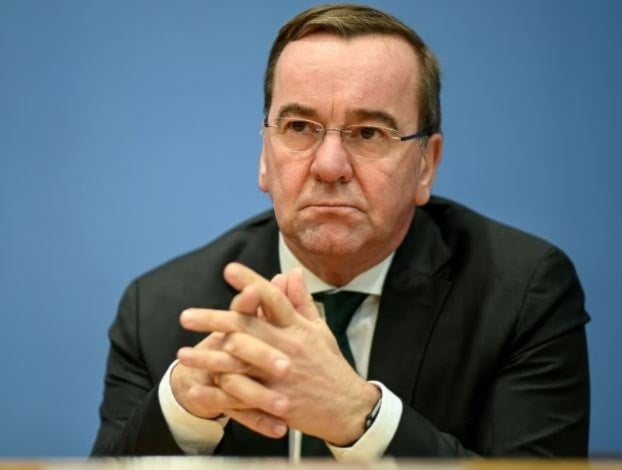Germany to send 4,000 drones to Ukraine, withholds missiles
The drones will be delivered in phases, with the first batch expected by December and several hundred more delivered monthly thereafter.
-

German Defense Minister Boris Pistorius (AFP via Getty Images)
Germany is set to send 4,000 advanced drones to Ukraine, dubbed "mini-Tauruses", as part of its growing support for Ukraine’s defense efforts. These unmanned aerial vehicles (UAVs), developed by German defense company Helsing, are equipped with AI systems, enhancing their autonomy in complex missions.
Designed for kamikaze-style attacks, they are reportedly effective against high-value targets and in electronic warfare conditions.
German Defense Minister Boris Pistorius confirmed the plan, highlighting the drones' role in boosting Ukraine's tactical capabilities. The drones will be delivered in phases, with the first batch expected by December and several hundred more delivered monthly thereafter.
The AI-driven drones offer improved navigation, allowing them to strike targets with precision even in harsh weather or difficult terrain, including areas subjected to “scorched earth” tactics. With an operational range reportedly four times greater than conventional Ukrainian kamikaze drones, these UAVs are reportedly poised to significantly enhance Ukraine’s offensive capabilities.
In a related development, a German government spokesperson confirmed on Monday that Germany’s position on supplying long-range missiles to Ukraine remains unchanged, despite the US reversing its stance to permit the use of US-made weapons for strikes deep within Russia.
"The chancellor's decision is unchanged," the spokesperson stated during a regular press conference in Berlin. While Germany is Ukraine’s second-largest military aid donor after the US, Chancellor Olaf Scholz has reportedly resisted providing Ukrainian forces with German-made Taurus long-range missiles, citing concerns over escalating the conflict with Russia.
Dive deeper
The shipment of "mini-Taurus" drones follows a memorandum of cooperation signed in February 2024 between Ukraine's Ministry of Strategic Industries and Helsing, emphasizing Germany’s commitment to strengthening Ukraine's defense through military aid and industrial partnerships.
Despite this, Chancellor Olaf Scholz has continued to reject the provision of long-range Taurus missiles to Ukraine, a position that has sparked debate within German politics.
Friedrich Merz, leader of the opposition Christian Democratic Union (CDU), has strongly advocated for sending the missiles, claiming that it would not constitute active involvement in the conflict. Additionally, members of the Free Democratic Party (FDP) have suggested that the Bundestag may hold a vote on the issue.
Putin to Scholz: Any deal on Ukraine should consider Russia security
Russian President Vladimir Putin told German Chancellor Olaf Scholz that any deals on Ukraine should consider Russian security interests, develop from new geographical realities, and address the core causes of the conflict, a statement by the Kremlin revealed last week.
German sources confirmed that German Chancellor Olaf Scholz and Russian President Vladimir Putin spoke by phone on Friday for the first time in over two years for "an hour", discussing the Ukraine war, the Middle East, and energy issues.
Putin has not talked with most NATO and Western leaders since 2022 when the EU and US slapped heavy sanctions on Russia for the war in Ukraine, yet he maintains contact with Hungarian Prime Minister Viktor Orban, who is skeptical of Western policy toward Russia, and Turkish President Recep Tayyip Erdogan.
A Kremlin statement revealed that the call was held "on the initiative of the German side," asserting that the aides of Putin and Scholz will be in touch.
During the call, Putin stressed that Russia has never rejected and is still willing to resume talks on Ukraine.
"The Russian side has never refused and remains open to resuming the negotiations that were interrupted by the Kiev regime. Russia's proposals are well known and were outlined, in particular, in a speech at the Russian Foreign Ministry in June," a Kremlin statement explained.
Meanwhile, a German government spokesperson said in a written statement, “The Chancellor urged Russia to be prepared to negotiate with Ukraine with the aim of achieving a just and lasting peace."
Read more: UK, France could reassess Russia strikes for Europe security: Diplomat

 4 Min Read
4 Min Read









